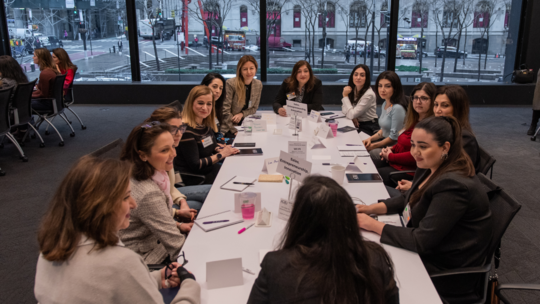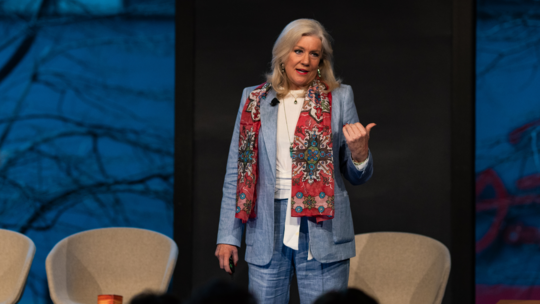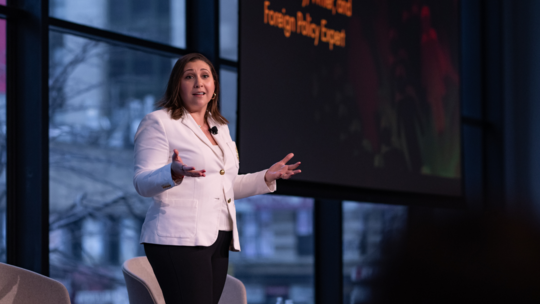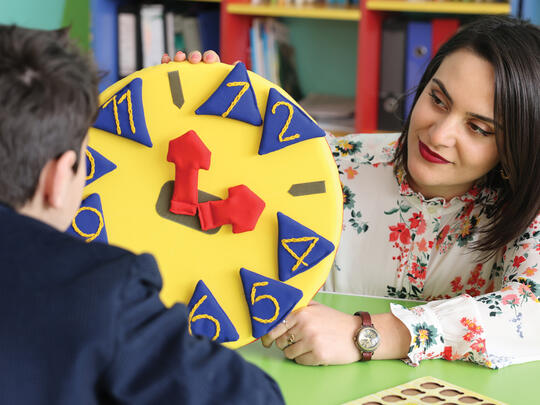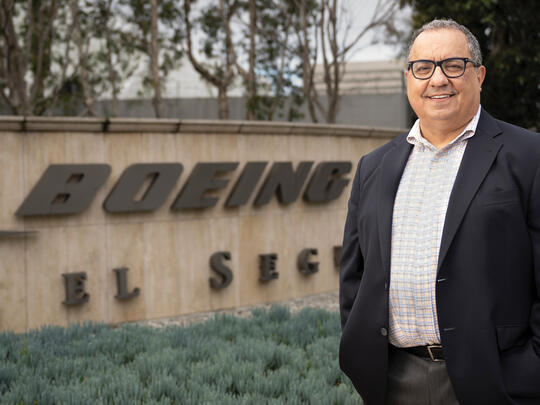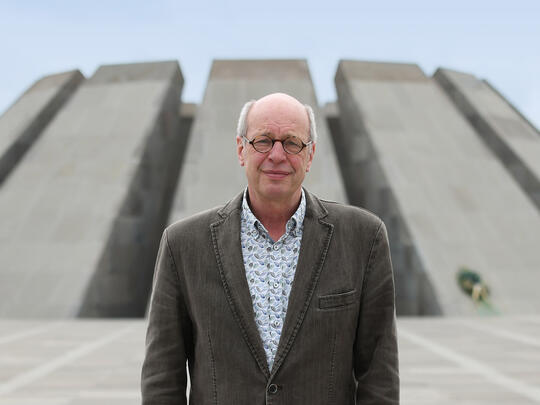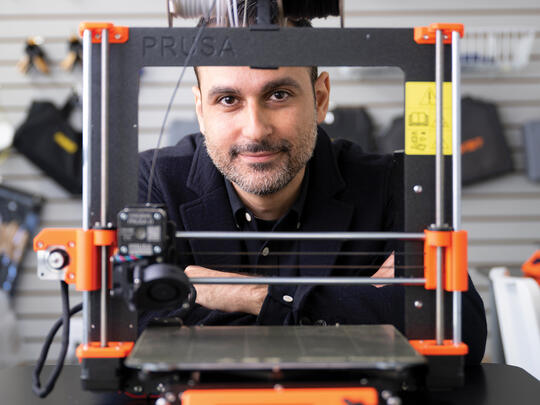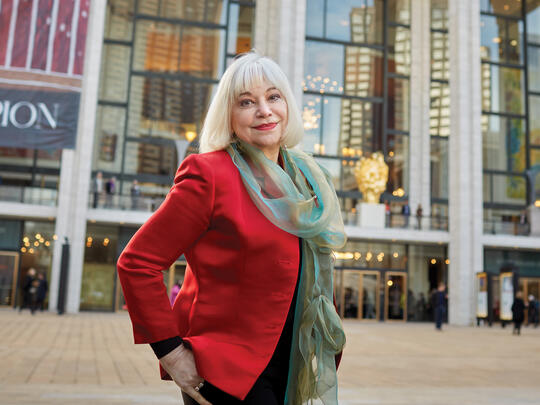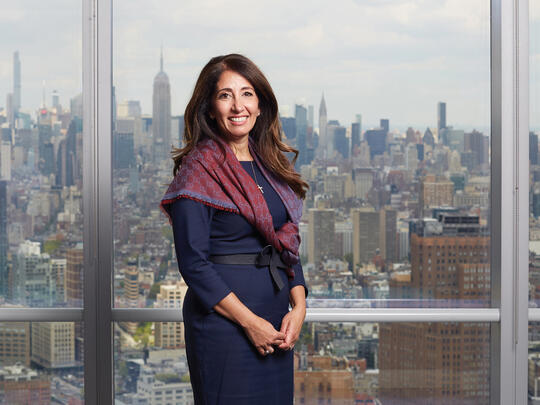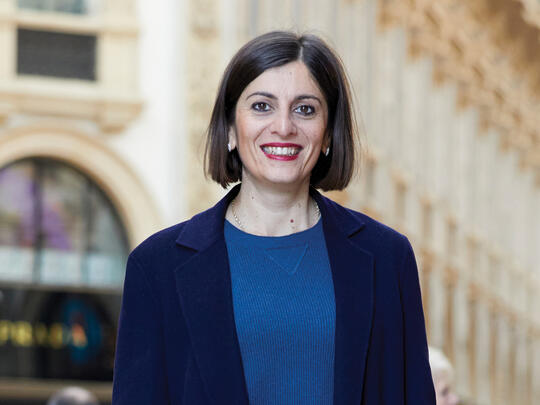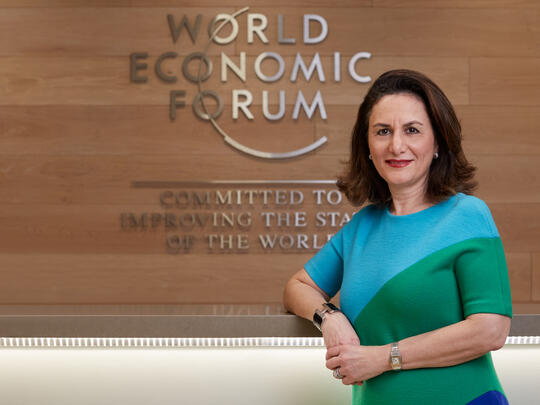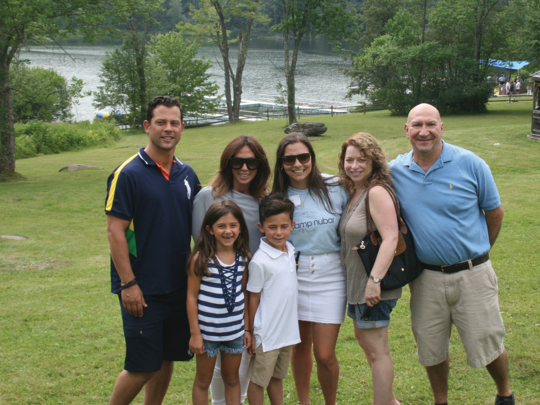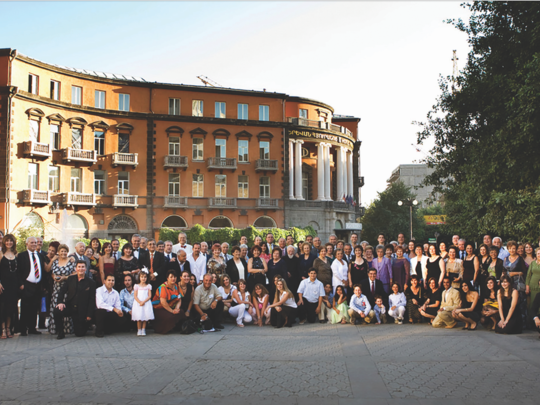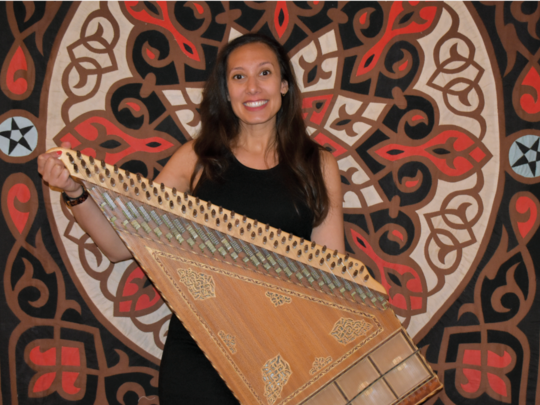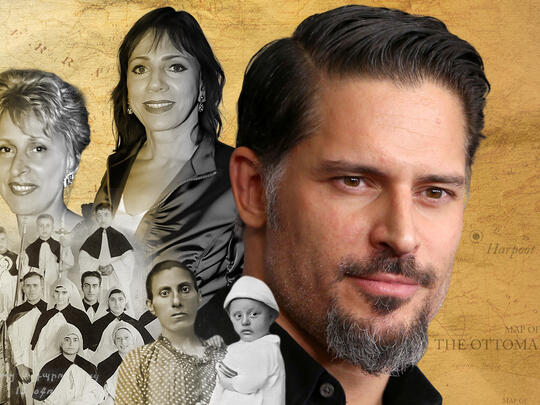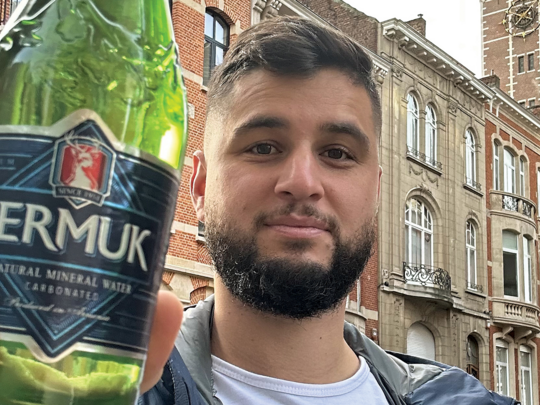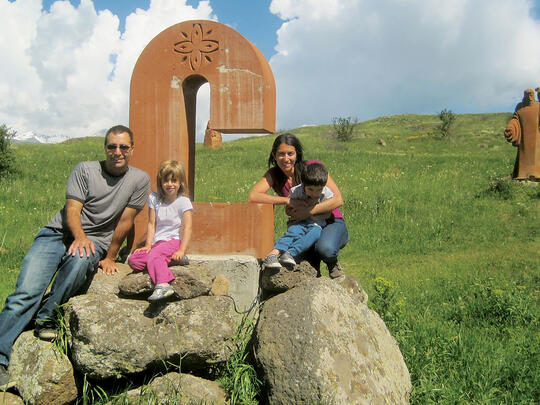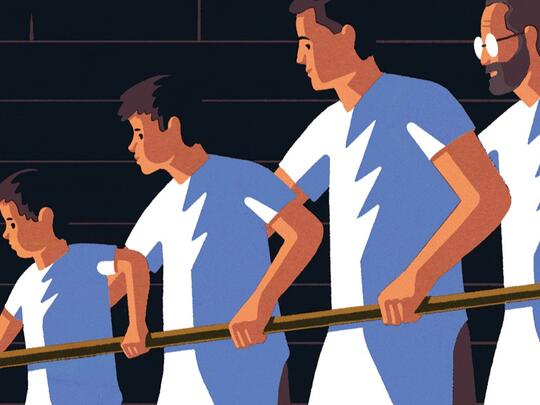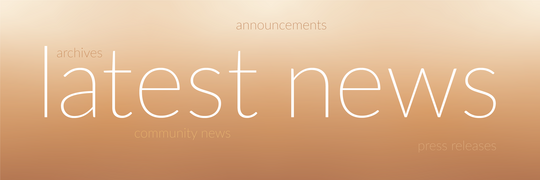
AGBU Highlights Exemplary Female Leaders at its Second Women Shaping The World Conference
A few days after the world celebrated International Women’s Day, attendees from the East and West Coast and beyond gathered at the sprawling Convene conference spaces in downtown New York to pick up where they left off three years earlier at the first AGBU Women Shaping the World (WSTW) event. The diverse group of nearly 150 ranged from students and AGBU Young Professionals of Greater New York to established experts in their industries, community volunteers, and supportive men.
The all-day agenda, organized by the female-led AGBU WSTW committee, was created for learning, sharing and networking. It featured two keynote speakers, a four-way panel discussion, and two breakout sessions for attendees—all with the purpose of reinforcing the overarching theme of resilience — made possible when empowered women empower other women.
A number of companies, including local and global business and donors like L’oréal Paris, SAINT, Lorens NYC, Gabriel Ceslov Paintings and the Haratunian Family, sponsored the event.
EmpowerHer to EmpowerAll
In her welcoming remarks, AGBU Central Board member and media consultant Arda Haratunian provided an update on AGBU’s EmpowerHer programs — sharing that over 450 women from Armenia and 45 from Artsakh have completed the Women Entrepreneurs (WE) Program. The comprehensive WE program is aimed to empower and encourage female business owners in Armenia and Artsakh, developing businesses from passion to maximize success.
Moreover, thanks to donor support, over $500,000 has been made available for mini-grants. To date, the program has helped launch 209 startups and 255 scale-ups. Other dimensions of the EmpowerHer offering combine psycho-social components that work together to change preconceived notions of the role of women in society and teach essential skills to enterprising women seeking to gain financial and social independence as the key to an empowered life.
Another component of this program is the Women Coders program, designed to bring more female talent to tech. The training program, launched in 2020, offers a diverse range of technology courses, mentorships, workshops, and networking opportunities to women throughout Armenia and Artsakh. Over 200 participants have been impacted, with 66% finding jobs in the IT industry and 60% saying their lives completely changed after this program. Haratunian also asserted that empowering the women of Armenia and Artsakh with such programs would ultimately empower the Armenian nation overall.
Throughout the day, the AGBU Bookstore sold unique products from WE participants, which were available for sale with proceeds going back to the program. To purchase WE products, visit https://agbubookstore.org/collections/agbu-women-entrepreneurs-collection.
The Significance of Civility and Joy
The first segment opened with keynote remarks by Shelby Scarbrough, author, entrepreneur, and co-founder of the Global School of Entrepreneurship. Scarbrough detailed her career path from political appointee in the Reagan and Bush Administrations and working with elite leaders and heads of state on her journey to owning her own business. She recognized the men and women who shaped her life and advised the audience that intentional acts of kindness would always come back tenfold. She also advised that civility, or kindness, mends the path to success, not only in the workplace but in the quilt of life. “If we are society, and the patches on the quilt are the countries, states, cities, or towns that we live in, the stitches are the civility that binds us together,” she shared. Her recommendation to achieve civility was through spreading pockets of happiness with others. “If we spread joy, it's a gift to everybody.”
Industry EmpowerHour
As Scarbrough shared, open arms and a strong support system are key to empowerment. With this in mind, participants broke out into eight different EmpowerHour groups to network with like-minded professionals in their industries, gaining invaluable insight and connections. Guests discussed obstacles within their fields, the short and long-term impacts these issues had on their career plans, and post-Covid shifts and adaptations their industries have noticed. Such trends included salary transparency, navigating success as female immigrants, juggling passions and expectations, overcoming the “mom” stigma, and advocating for better roles with all-male colleagues.
Participants from the health, medicine, and science industry, for example, were able to share experiences, from students figuring out their preferred field or research to those navigating a fair salary and accomplished women balancing childcare, travel, and work. In another workshop focused on non-profit organizations, issues around recruiting volunteers, showing them proper gratitude, and understanding that every non-profit is run like a regular business were explored.
Breaking Down Barriers
Next up was a panel discussion with a host of powerhouse individuals, moderated by independent film and television producer Alexis Alexanian, former president of the Board of New York Women in Film & Television (NYWIFT) with various award-winning production credits. She opened the dialogue with how refreshing it was to be in a room of Armenian women. “I’ve been working in the women’s space in film and television for a very long time, and I do this type of thing all the time, but never for my sisters, my compatriots,” she said.
“In film and television, we’re constantly bombarded by topics of diversity, more voices, women’s voices — but we never see us, do we? We don’t see our faces. We don’t hear our stories. But today, we have three very interesting and wonderful Armenian women and we’re here to listen, learn, and share.”
Zara Ingilizian, head of consumer industries at the World Economic Forum, kicked off the panel with the significance of impact, particularly within the health and wellbeing space. Her experience working with consumer companies and CEOs in the private and public sector has taught her to advance responsible consumption models with the end goal of improving people’s quality of life by identifying the major challenges within the food system. “Globally, we have a food system that is producing for the most part, affordable, accessible food, but it’s ultimately making people sick,” she said, emphasizing the importance of a healthy gut, known as the second brain. Ingilizian also shared insight into socially responsible innovation and her journey with empowerment. “I have grown the most when I have taken on roles that were extremely challenging and were outside my comfort zone — and I did this twice.”
Maral Kazanjian, chief people officer at Moody’s Corporation and former chief people officer for WeWork, shared important insights into the workforce today. “Fifty percent of our world is women, fifty percent of entry-level companies are women, thirty-eight percent are first-level management, twenty-eight percent are senior management, and a very small number are executives,” she shared. “That pyramid has to become untrue for very simple commerce to function. We are in a powerful position to have agency and authority to advocate for the careers that we want.” She also chimed in on the hybrid model of work. “People need flexibility. They need agency. They need control over their life and their time within reasonable rules. And they need clarity about what's expected of them.”
Victoria Waterman, CEO of Girls Inc. of Worcester and TedxNatick Speaker, has devoted her career to the advancement of women and inspiring girls to be strong, smart, and bold through the nonprofit— yet her biggest obstacle was believing in herself. She shared her journey into reframing her perception of her worth: “What was it about me that [recruiters seeking a non-profit leader] were seeing? Because I couldn't see it. I don't work for a company with deep pockets. I don't come from a wealthy family,” she said. “And so I reframed — I don't know anybody more qualified than me.” She has also taken on a new role as an author and documented the story of female Armenian resilience post-genocide with her upcoming novel, portraying the women as the protagonists rather than victims.
The panel ended with a reflection of Armenian identity in the workplace. “When I think of being Armenian, I think of it as being a great differentiator,” noted Ingilizian. And it's only been an asset to be Armenian. Not just because of the values we are taught and this amazing history that we have, which obviously I'm extremely proud of and the contributions we have had in the world and continue to do. Kazanjian agreed, adding: “Armenians have a couple of very special qualities that differentiate us in the working world. One is our humility. We lead with humility whether we want to or not. We focus on education and we care about it so passionately and that combination is pretty special. And we care. We care about what we do and we care about the people around us. So that combination makes us really special.”
Mentors and Networks
Political satirist and news personality Hagar Hajjar Chemali closed the conference as keynote speaker with wise words about the world of government, politics, and media. “My network of mentors and champions is a key part in my success,” she said. “I’ve collected them along the way — from former bosses, friends, and leaders, and when I hit bumps in the road — and I hit bumps in the road — it’s my mentors and champions that catch me when I fall, who help me strategize my next steps, who see a perspective I might not be able to see and help me figure out what to do next or connect me to another person.” This was particularly helpful when she made the switch from working on policy in the Middle East in the White House to building her own brand of humorous political commentary for a Gen-Z audience, “Oh My World.” The video series is rooted in this mission that by raising awareness and by giving viewers the tools to act, they end up affecting change. “I’ve always been driven by following my gut — which is really all we have,” Chemali concluded.
Insights and Takeaways
Participants broke off into six smaller and more intimate EmpowerHours to discuss universal ways to get ahead and stand out for women in the workplace, including building a “brag” log at work, overcoming imposter syndrome and a fear of public speaking, using social media as a tool to get ahead, and maximizing the hybrid model of work to climb the ladder.
All participants left with new connections, insights, and a sense of empowerment. One participant shared, “I learned that I have to set myself up to be heard at work. I was advised to learn the business of the business and ask myself, how does my job contribute to outcomes? Numbers and results make a difference when self-advocating.”
To learn more about the AGBU EmpowerHer program and volunteer and donor opportunities, go to https://agbu.org/empowerher.


